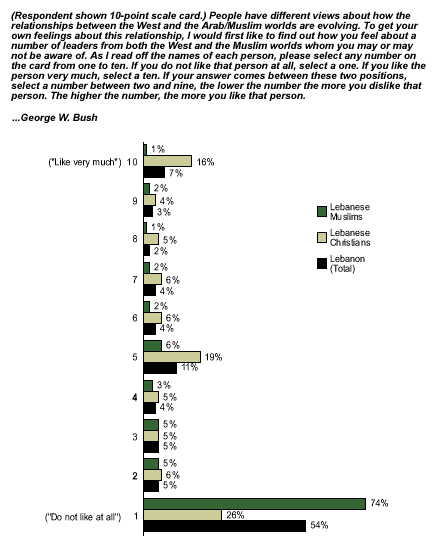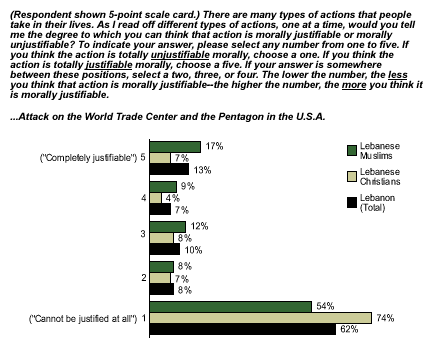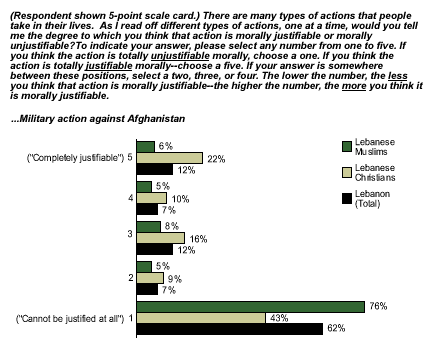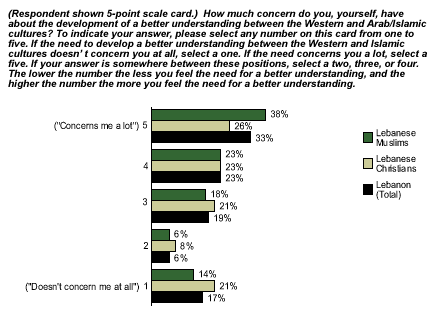Of the nine nations surveyed in the 2002 Gallup Poll of the Islamic World, Lebanon is by far the most religiously diverse. A total of 1,050 Lebanese adults were interviewed in 140 different sampling locations throughout the country. Of these, 603 (57%) were Muslims, while 447 -- nearly 43% -- were Christians. The Lebanese data therefore offer a valuable opportunity for a comparative glimpse at the attitudes of adherents to these two faiths, within the context of a single political entity.
Views of the United States and President Bush
Within Lebanon, Christians take a systematically more sympathetic view of the United States than do their Muslim compatriots. While three-fifths (62%) of Christian Lebanese say they have either a "somewhat" or "very" favorable opinion of the United States, only 26% of Muslims within Lebanon hold similarly positive feelings. When asked to rate George W. Bush on a 10-point favorability scale, nearly three-quarters (74%) of Muslim Lebanese give him the lowest possible ranking ("not liked at all"), while only 26% of Christian Lebanese do so.

What are the specific components of Lebanese Muslims' more negative assessment of the United States? Respondents were shown a list of 12 descriptive attributes and 11 countries; for each attribute, they were asked to which country or countries, if any, they felt that description applied.
As illustrated in the table below, Muslim Lebanese are significantly more likely than Christian Lebanese to view the United States as "aggressive," "conceited," "easily provoked," and "arrogant." Majorities of both faiths see the United States as a country that "adopts biased policies in world affairs," and nearly as many view the United States as "ruthless." Here again, however, Muslim Lebanese are more likely than Christian Lebanese to see these descriptions as being applicable to the United States.
|
Percent who say this description applies to the United States |
|||
|
Lebanon (Total) |
Lebanese Muslims |
Lebanese Christians |
|
|
"aggressive" |
64% |
82% |
40% |
|
"conceited" |
61% |
70% |
50% |
|
"gets provoked easily" |
62% |
70% |
50% |
|
"arrogant" |
56% |
64% |
47% |
|
"ruthless" |
76% |
84% |
65% |
|
"adopts biased policies in world affairs" |
79% |
85% |
72% |
Attitudes Toward Sept. 11 Attacks and U.S.-Led Military Response in Afghanistan
One of the sharpest divergences between Muslim and Christian Lebanese concerns their perception of who was responsible for the Sept. 11 attacks on the World Trade Center and Pentagon. Nearly three-quarters (74%) of Muslim Lebanese say they do not believe news reports that groups of Arabs carried out these attacks. In direct contrast, nearly two-thirds (65%) of Christian Lebanese accept the veracity of this assertion, while only one in three views it as false.
Attitudes on the moral admissibility of the attacks -- and of the U.S. military response in Afghanistan -- also divide to some extent along religious lines, though less sharply. Within Lebanon, only a small minority of each faith views the Sept. 11 attacks as being either predominantly or completely justifiable, though Muslims (26%) are more likely to take this position than are Christians (10%). It should be noted, however, that the single most common response among Lebanese Christians and Muslims alike is that these attacks "cannot be justified at all" (Christians 74%, Muslims 54%).
Both faiths are also unsupportive of the ensuing U.S.-led military action in Afghanistan. Only about a third of Lebanese Christians (32%) see this as mostly or completely justifiable morally, while only a little over one in 10 Lebanese Muslims (11%) does so.


Interest in Better Relationship With Western Societies
Although they hold relatively negative perceptions of the United States, it would be incorrect to conclude that Muslim Lebanese are relatively unconcerned about the possibility of improved relations between Western societies and the Islamic world. Muslims in Lebanon are actually more likely than their Christian compatriots to describe "a better understanding between Western and Arab/Islamic cultures" as a consideration of personal concern to them. Fully 61% of Muslim Lebanese describe such an improvement in understanding as something of personal concern to them -- as do roughly half (49%) of Christian Lebanese. Within each group, less than a third describe themselves as personally unconcerned about an improved understanding between Islam and the West.
Similarly, nearly three-fifths of Muslims in Lebanon (63%) say they believe the Arab world is eager to have a better relationship with the West -- a view held by just under half (45%) of Christians within Lebanon.

